Unit 4 Section A(3a-3c) 课件(人教新目标九年级全Unit 4 I used to be afraid of the dark
文档属性
| 名称 | Unit 4 Section A(3a-3c) 课件(人教新目标九年级全Unit 4 I used to be afraid of the dark |
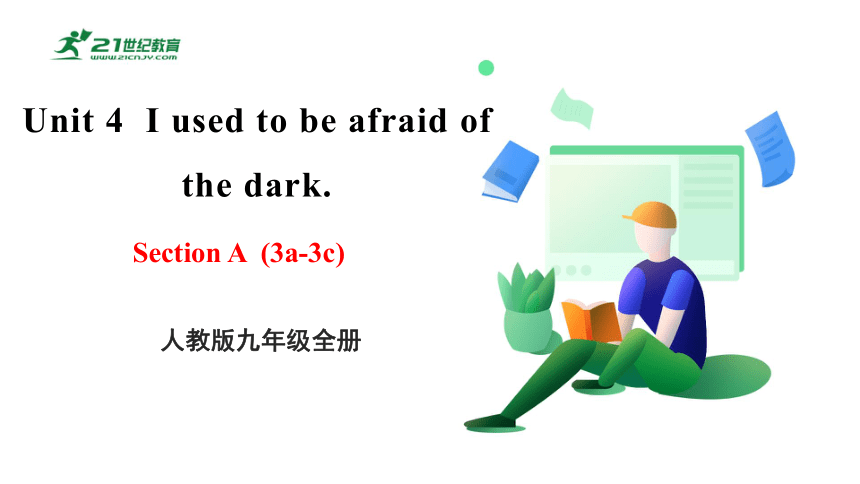
|
|
| 格式 | pptx | ||
| 文件大小 | 1.3MB | ||
| 资源类型 | 试卷 | ||
| 版本资源 | 人教新目标(Go for it)版 | ||
| 科目 | 英语 | ||
| 更新时间 | 2023-08-21 00:00:00 | ||
图片预览

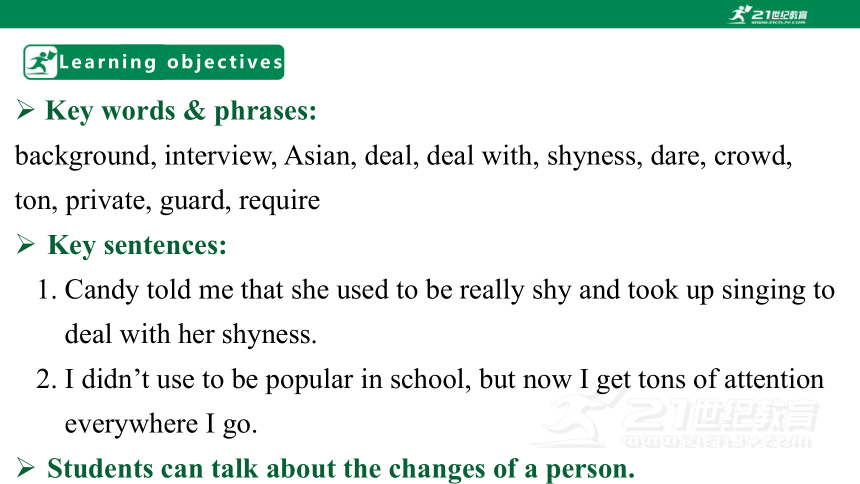


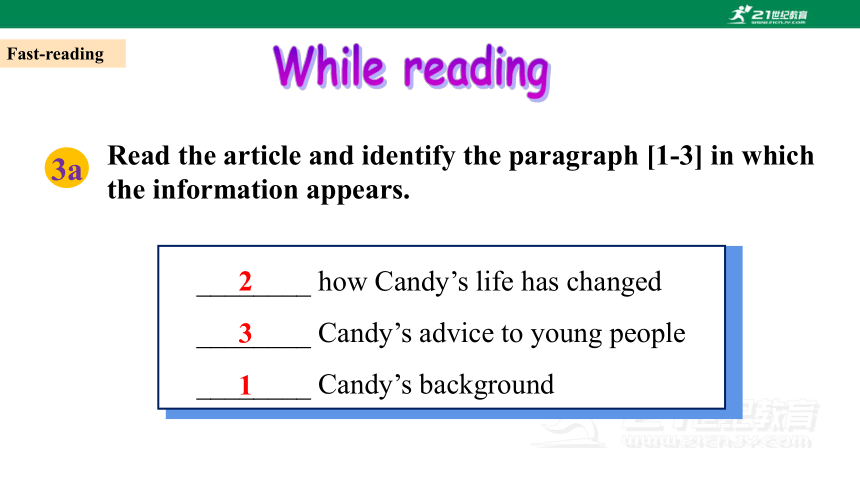
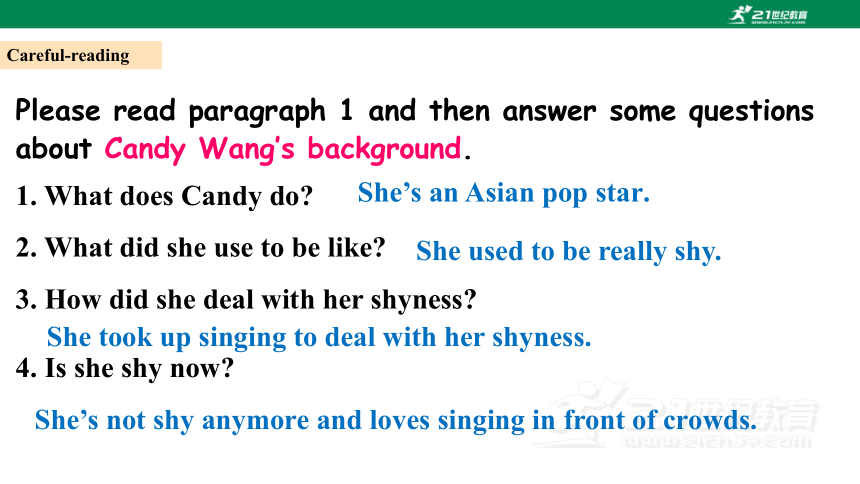
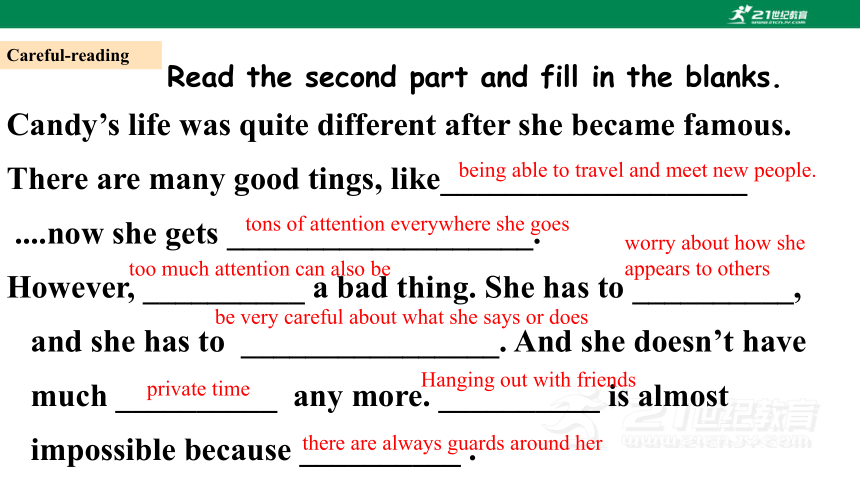
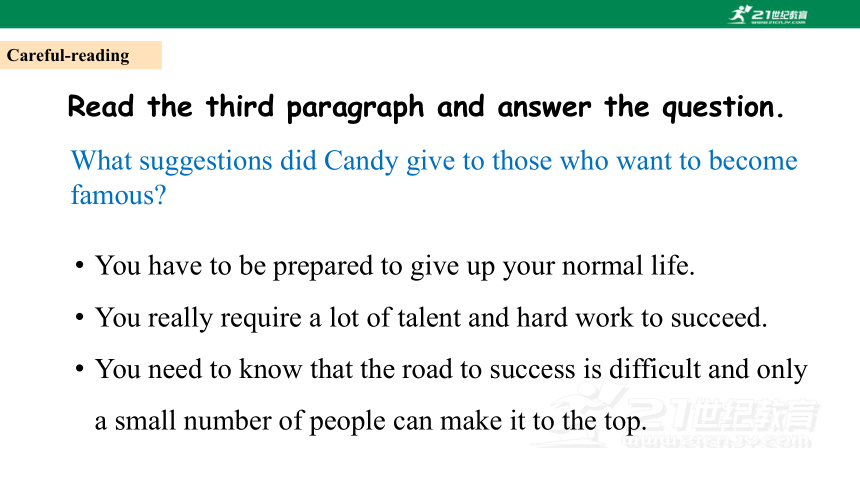
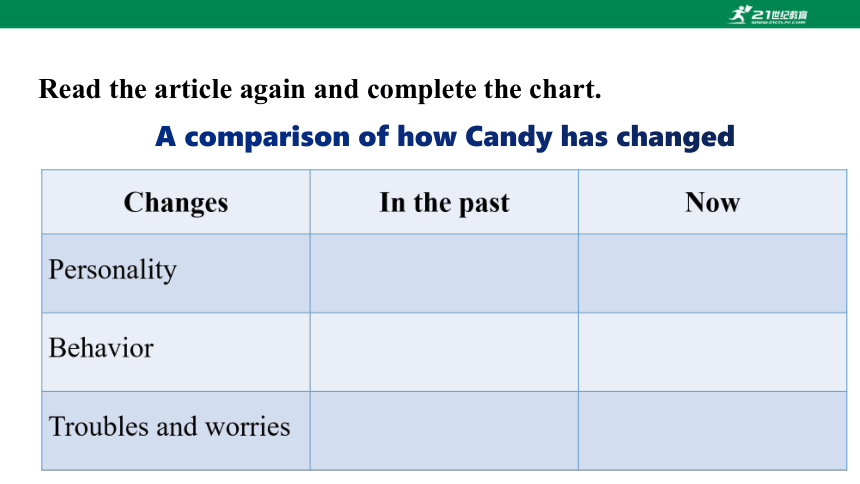
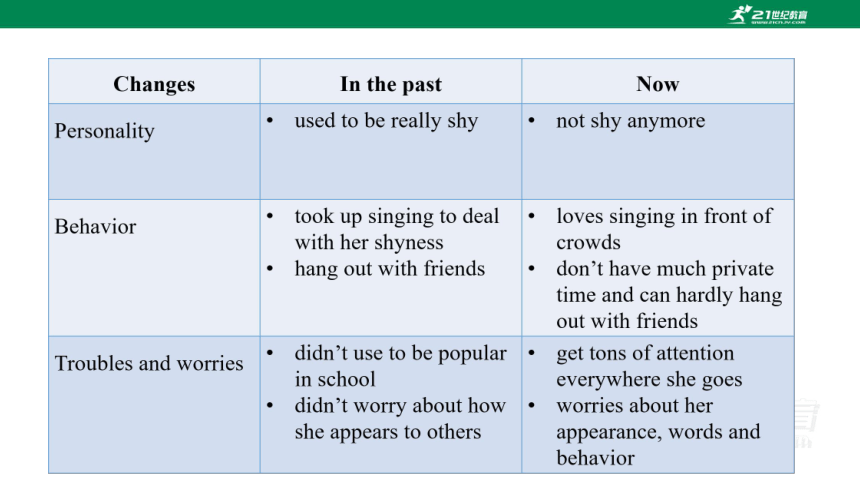
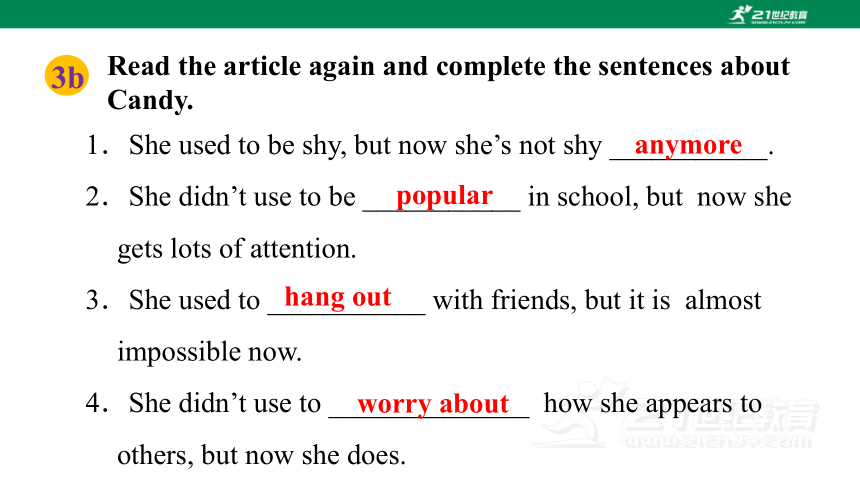

文档简介
(共37张PPT)
Unit 4 I used to be afraid of
the dark.
人教版九年级全册
Section A (3a-3c)
Learning objectives
Key words & phrases:
background, interview, Asian, deal, deal with, shyness, dare, crowd,
ton, private, guard, require
Key sentences:
1. Candy told me that she used to be really shy and took up singing to
deal with her shyness.
2. I didn’t use to be popular in school, but now I get tons of attention
everywhere I go.
Students can talk about the changes of a person.
Did you have any change in your personality, hobby or behavior in the past years
Talk about it with your partners.
According to the title and the picture.
Can you guess What the passage is about
From Shy Girl to Pop Star
predict
The changes of the pop star.
Read the article and identify the paragraph [1-3] in which the information appears.
3a
________ how Candy’s life has changed
________ Candy’s advice to young people
________ Candy’s background
2
3
1
Fast-reading
While reading
Please read paragraph 1 and then answer some questions about Candy Wang’s background.
1. What does Candy do
2. What did she use to be like
3. How did she deal with her shyness
4. Is she shy now
She’s an Asian pop star.
She used to be really shy.
She took up singing to deal with her shyness.
She’s not shy anymore and loves singing in front of crowds.
Careful-reading
Read the second part and fill in the blanks.
Candy’s life was quite different after she became famous.
There are many good tings, like___________________
....now she gets ___________________.
However, __________ a bad thing. She has to __________, and she has to ________________. And she doesn’t have much __________ any more. __________ is almost impossible because __________ .
there are always guards around her
being able to travel and meet new people.
tons of attention everywhere she goes
too much attention can also be
worry about how she appears to others
be very careful about what she says or does
private time
Hanging out with friends
Careful-reading
Read the third paragraph and answer the question.
What suggestions did Candy give to those who want to become famous
You have to be prepared to give up your normal life.
You really require a lot of talent and hard work to succeed.
You need to know that the road to success is difficult and only a small number of people can make it to the top.
Careful-reading
Read the article again and complete the chart.
A comparison of how Candy has changed
Read the article again and complete the sentences about Candy.
3b
1.She used to be shy, but now she’s not shy ___________.
2.She didn’t use to be ___________ in school, but now she gets lots of attention.
3.She used to ___________ with friends, but it is almost impossible now.
4.She didn’t use to ______________ how she appears to others, but now she does.
anymore
popular
hang out
worry about
Background Changes Advice
dare to sing
took up singing
used to be shy
isn’t shy anymore
travel and meet new people
get tons of attention
worry about…
appear to others
be careful about what…
have no private time
give up your normal life
fight on
require a lot of talent
and hard work
Retell the article according to the key words
Post reading
3c
Suppose you are the interviewer and your partner is Candy. Ask and answer questions.
Language Points
For this month’s Young World magazine, I interviewed 19-year-old Asian pop star Candy Wang.(教材P27)
interview v. 采访;面试 n. 面试;访谈
interview的常用短语有:
interview sb. 采访某人
interview sb. about sth. 就某事采访某人
have an interview with sb. 采访某人
19-year-old是复合形容词,它由“数词+名词(单数)+形容词”构成,而且三者之间要用“-”来连接,它用在名词前作定语。
e.g. Tony is a 18-year-old young man.
Tony是个18岁的年轻人。
【拓展】
19 years old由“数词+名词(复数)+形容词”构成,而且三者之间不用“-”连接,它在句子中作表语。
e.g. Tony is 18 years old. Tony18岁了。
Candy told me that she used to be really shy and took up
singing to deal with her shyness.(教材P27)
take up “(通常作为爱好)开始学习,开始练习”,后面可以接名词或动名词(短语)。
e.g. I was thinking to take up dancing.
我正在考虑去学习跳舞。
She took up the guitar at the age of 11.
她11岁开始学习吉他。
【拓展】
take up还有“占据”的意思。
e.g. The new couch takes up half of the room.
新沙发占去房间的一半。
I don’t want to take up too much of your time, but I
have a few questions.
我不想占用你太多的时间,但我确实有一些问题。
deal with 处理; 应对
e.g. I deal with the problem myself. 我自己处理了这个问题。
【拓展】
do with和 deal with的区别
1.do with和 deal with两者都可以表示“应对,处理,安排”,但是 deal是不及物动词,可以与 how连用;而 do是及物动词,只能与 what连用。
2.do with经常与连接代词 what连用,而 deal with经常与连接副词 how连用
I don' t know how they deal with problem.
= I don' t know what they tho with the problem.
我不知道他们怎么处理这个问题.
shyness n. “害羞;腼腆”,是不可数名词,是由“shy(adj.)+ ness(后缀)”构成。名词后缀-ness,通常放在形容词后,构成抽象名词。
类似的单词还有:
carelessness 粗心 happiness 高兴
sadness 难过 tiredness 疲劳;疲倦
kindness仁慈,亲切,和蔼 darkness 黑暗
As she got better, she dared to sing in front of her class, and then for the whole school.(教材P27)
dare v. “敢于;胆敢”,通常不用于进行时态。dare作实义动词时后面跟动词不定式(to + v.)作宾语,有人称和数以及时态的变化。构成疑问句和否定句时常借助助动词do。
e.g. Do we dare ask why = Dare we ask why
我们敢问为什么吗?
She doesn’t dare to talk back to her parents.
她不敢跟父母顶嘴。
【拓展】
don’t you dare 你敢,谅你不敢(用于口语,表示让人绝不要做某事)。
e.g. Don’t you dare do that again, or you’ll be sorry.
谅你也不敢再那么做,你会后悔的。
— I’m going to tell mom that you got an “F” on your test.
— Don’ you dare!
—我要告诉妈妈你考试不及格。
—你敢!
how dare you 你竟敢(用于口语,表示对某人的行为或话语很气愤)
e.g. How dare he speak to you like that!
他竟敢对你那样讲话!
I dare say 我想;可能;大概
e.g. I dare say he’s right.
我想他是对的。
This is, I dare say one of the most beautiful places in the
world.
这里大概是全世界最美的地方之一。
I didn’t use to be popular in school, but now I get tons of attention everywhere I go.(教材P27)
tons of“大量,许多”,后面接不可数名词或可数名词复数,相当于a lot of。
e.g. We have tons of food left over from the party.
我们的聚会剩下了许多食物。
The old man gave away tons of money last year.
去年那位老人捐了许多钱。
And I don’t have much private time anymore. (教材P27)
private adj.“私人的;秘密的”,其同义词为personal。
e.g. It’s wrong to read people’s private letters without permission.
未经允许阅读别人的私人信件是不对的。
not ... anymore 不再
e.g. I’m sorry I won’t throw the rubbish everywhere anymore.
= I’m sorry I no more throw the rubbish everywhere.
对不起我再也不会把垃圾到处扔了。
e.g. I don’t do yoga anymore.
我不再做瑜伽了。
He does not live here any longer.
他不再住在这里了。
⑥ Hanging out with friends is almost impossible for me now
because there are always guards around me.(教材P27)
这句话用到了动名词短语作主语。动名词(短语)作主语多用来表示泛指或习惯的动作。(不定式也可以作主语,表示特指或具体的动作。)
e.g. Smoking is not good for health.
吸烟对健康没有好处。
To finish this job in one day is impossible.
要在一天之内完成这项工作是不可能的。
hang out “(和某人)在一起;闲逛”,其过去式和过去分词均为hung。
e.g. He spent a couple of days hanging out with his old friends.
他和几个老朋友待了两天。
Last Saturday my friend and I hung out in the shopping center.
上周六我和朋友在购物中心闲逛。
You can never imagine how difficult the road to success is.
(教材P27)
the road to success “通向成功的路”,其中to是介词,后面跟名词或v.-ing形式。
the road to sth.是英语的一种固定表达方式,此处road并非指真实的“道路”,属于修辞手法,意指“途径;通道”。它可以独立使用,承担句子的主语、宾语等。
You really require a lot of talent and hard work to succeed. (教材P11)
require v. 需要; 要求
require的常见搭配有:
require sth. 需要某物
e.g. Students at this level require a lot of help.
这个水平的学生需要很多帮助。
require sb. to do sth. 要求某人做某事
e.g. The teacher required Tom to keep quiet.
老师要求汤姆保持安静。
require + that从句(从句的谓语动词用“should + 动词原形”,should可以省略)
e.g. The law requires that everyone (should) pay the tax.
法律要求人人纳税。
Only a very small number of people make it to the top.
(教材P27)
a small number of 一小部分
e.g. A small number of students walk to school every day.
一小部分学生每天步行去上学。
a number of短语中number的前面可以加修饰词small或large来表示数量的大小。
e.g. A small number of children are educated at home.
少数孩子在家接受教育。
The number of the students in our class is 40.
我们班学生的人数是40。
1. — My father has decided to _____ smoking.
— That’s good news for us. I hope so.
A. give up B. take out
C. give in D. turn off
2. —I don’t know how to____the old books.
—Why not give them away to poor children
A. hand out B. give up
C. deal with D. take up
Exercises
3. — She is leaving to take part in the final poem competition.
— I’m proud of her. I wish her a great ________.
A. speed B. method
C. pressure D. success
4. — I don’t think teachers should give too much homework to_______
the free time of students.
— Exactly!
A. give up B. take up
C. look up D. put up
Homework
1.Remember the words and phrases of this class.
2.Draw a mind map and tell something about Candy to others.
3.Do the exercises in students’ book.
谢谢
21世纪教育网(www.21cnjy.com)
中小学教育资源网站
兼职招聘:
https://www.21cnjy.com/recruitment/home/admin
Unit 4 I used to be afraid of
the dark.
人教版九年级全册
Section A (3a-3c)
Learning objectives
Key words & phrases:
background, interview, Asian, deal, deal with, shyness, dare, crowd,
ton, private, guard, require
Key sentences:
1. Candy told me that she used to be really shy and took up singing to
deal with her shyness.
2. I didn’t use to be popular in school, but now I get tons of attention
everywhere I go.
Students can talk about the changes of a person.
Did you have any change in your personality, hobby or behavior in the past years
Talk about it with your partners.
According to the title and the picture.
Can you guess What the passage is about
From Shy Girl to Pop Star
predict
The changes of the pop star.
Read the article and identify the paragraph [1-3] in which the information appears.
3a
________ how Candy’s life has changed
________ Candy’s advice to young people
________ Candy’s background
2
3
1
Fast-reading
While reading
Please read paragraph 1 and then answer some questions about Candy Wang’s background.
1. What does Candy do
2. What did she use to be like
3. How did she deal with her shyness
4. Is she shy now
She’s an Asian pop star.
She used to be really shy.
She took up singing to deal with her shyness.
She’s not shy anymore and loves singing in front of crowds.
Careful-reading
Read the second part and fill in the blanks.
Candy’s life was quite different after she became famous.
There are many good tings, like___________________
....now she gets ___________________.
However, __________ a bad thing. She has to __________, and she has to ________________. And she doesn’t have much __________ any more. __________ is almost impossible because __________ .
there are always guards around her
being able to travel and meet new people.
tons of attention everywhere she goes
too much attention can also be
worry about how she appears to others
be very careful about what she says or does
private time
Hanging out with friends
Careful-reading
Read the third paragraph and answer the question.
What suggestions did Candy give to those who want to become famous
You have to be prepared to give up your normal life.
You really require a lot of talent and hard work to succeed.
You need to know that the road to success is difficult and only a small number of people can make it to the top.
Careful-reading
Read the article again and complete the chart.
A comparison of how Candy has changed
Read the article again and complete the sentences about Candy.
3b
1.She used to be shy, but now she’s not shy ___________.
2.She didn’t use to be ___________ in school, but now she gets lots of attention.
3.She used to ___________ with friends, but it is almost impossible now.
4.She didn’t use to ______________ how she appears to others, but now she does.
anymore
popular
hang out
worry about
Background Changes Advice
dare to sing
took up singing
used to be shy
isn’t shy anymore
travel and meet new people
get tons of attention
worry about…
appear to others
be careful about what…
have no private time
give up your normal life
fight on
require a lot of talent
and hard work
Retell the article according to the key words
Post reading
3c
Suppose you are the interviewer and your partner is Candy. Ask and answer questions.
Language Points
For this month’s Young World magazine, I interviewed 19-year-old Asian pop star Candy Wang.(教材P27)
interview v. 采访;面试 n. 面试;访谈
interview的常用短语有:
interview sb. 采访某人
interview sb. about sth. 就某事采访某人
have an interview with sb. 采访某人
19-year-old是复合形容词,它由“数词+名词(单数)+形容词”构成,而且三者之间要用“-”来连接,它用在名词前作定语。
e.g. Tony is a 18-year-old young man.
Tony是个18岁的年轻人。
【拓展】
19 years old由“数词+名词(复数)+形容词”构成,而且三者之间不用“-”连接,它在句子中作表语。
e.g. Tony is 18 years old. Tony18岁了。
Candy told me that she used to be really shy and took up
singing to deal with her shyness.(教材P27)
take up “(通常作为爱好)开始学习,开始练习”,后面可以接名词或动名词(短语)。
e.g. I was thinking to take up dancing.
我正在考虑去学习跳舞。
She took up the guitar at the age of 11.
她11岁开始学习吉他。
【拓展】
take up还有“占据”的意思。
e.g. The new couch takes up half of the room.
新沙发占去房间的一半。
I don’t want to take up too much of your time, but I
have a few questions.
我不想占用你太多的时间,但我确实有一些问题。
deal with 处理; 应对
e.g. I deal with the problem myself. 我自己处理了这个问题。
【拓展】
do with和 deal with的区别
1.do with和 deal with两者都可以表示“应对,处理,安排”,但是 deal是不及物动词,可以与 how连用;而 do是及物动词,只能与 what连用。
2.do with经常与连接代词 what连用,而 deal with经常与连接副词 how连用
I don' t know how they deal with problem.
= I don' t know what they tho with the problem.
我不知道他们怎么处理这个问题.
shyness n. “害羞;腼腆”,是不可数名词,是由“shy(adj.)+ ness(后缀)”构成。名词后缀-ness,通常放在形容词后,构成抽象名词。
类似的单词还有:
carelessness 粗心 happiness 高兴
sadness 难过 tiredness 疲劳;疲倦
kindness仁慈,亲切,和蔼 darkness 黑暗
As she got better, she dared to sing in front of her class, and then for the whole school.(教材P27)
dare v. “敢于;胆敢”,通常不用于进行时态。dare作实义动词时后面跟动词不定式(to + v.)作宾语,有人称和数以及时态的变化。构成疑问句和否定句时常借助助动词do。
e.g. Do we dare ask why = Dare we ask why
我们敢问为什么吗?
She doesn’t dare to talk back to her parents.
她不敢跟父母顶嘴。
【拓展】
don’t you dare 你敢,谅你不敢(用于口语,表示让人绝不要做某事)。
e.g. Don’t you dare do that again, or you’ll be sorry.
谅你也不敢再那么做,你会后悔的。
— I’m going to tell mom that you got an “F” on your test.
— Don’ you dare!
—我要告诉妈妈你考试不及格。
—你敢!
how dare you 你竟敢(用于口语,表示对某人的行为或话语很气愤)
e.g. How dare he speak to you like that!
他竟敢对你那样讲话!
I dare say 我想;可能;大概
e.g. I dare say he’s right.
我想他是对的。
This is, I dare say one of the most beautiful places in the
world.
这里大概是全世界最美的地方之一。
I didn’t use to be popular in school, but now I get tons of attention everywhere I go.(教材P27)
tons of“大量,许多”,后面接不可数名词或可数名词复数,相当于a lot of。
e.g. We have tons of food left over from the party.
我们的聚会剩下了许多食物。
The old man gave away tons of money last year.
去年那位老人捐了许多钱。
And I don’t have much private time anymore. (教材P27)
private adj.“私人的;秘密的”,其同义词为personal。
e.g. It’s wrong to read people’s private letters without permission.
未经允许阅读别人的私人信件是不对的。
not ... anymore 不再
e.g. I’m sorry I won’t throw the rubbish everywhere anymore.
= I’m sorry I no more throw the rubbish everywhere.
对不起我再也不会把垃圾到处扔了。
e.g. I don’t do yoga anymore.
我不再做瑜伽了。
He does not live here any longer.
他不再住在这里了。
⑥ Hanging out with friends is almost impossible for me now
because there are always guards around me.(教材P27)
这句话用到了动名词短语作主语。动名词(短语)作主语多用来表示泛指或习惯的动作。(不定式也可以作主语,表示特指或具体的动作。)
e.g. Smoking is not good for health.
吸烟对健康没有好处。
To finish this job in one day is impossible.
要在一天之内完成这项工作是不可能的。
hang out “(和某人)在一起;闲逛”,其过去式和过去分词均为hung。
e.g. He spent a couple of days hanging out with his old friends.
他和几个老朋友待了两天。
Last Saturday my friend and I hung out in the shopping center.
上周六我和朋友在购物中心闲逛。
You can never imagine how difficult the road to success is.
(教材P27)
the road to success “通向成功的路”,其中to是介词,后面跟名词或v.-ing形式。
the road to sth.是英语的一种固定表达方式,此处road并非指真实的“道路”,属于修辞手法,意指“途径;通道”。它可以独立使用,承担句子的主语、宾语等。
You really require a lot of talent and hard work to succeed. (教材P11)
require v. 需要; 要求
require的常见搭配有:
require sth. 需要某物
e.g. Students at this level require a lot of help.
这个水平的学生需要很多帮助。
require sb. to do sth. 要求某人做某事
e.g. The teacher required Tom to keep quiet.
老师要求汤姆保持安静。
require + that从句(从句的谓语动词用“should + 动词原形”,should可以省略)
e.g. The law requires that everyone (should) pay the tax.
法律要求人人纳税。
Only a very small number of people make it to the top.
(教材P27)
a small number of 一小部分
e.g. A small number of students walk to school every day.
一小部分学生每天步行去上学。
a number of短语中number的前面可以加修饰词small或large来表示数量的大小。
e.g. A small number of children are educated at home.
少数孩子在家接受教育。
The number of the students in our class is 40.
我们班学生的人数是40。
1. — My father has decided to _____ smoking.
— That’s good news for us. I hope so.
A. give up B. take out
C. give in D. turn off
2. —I don’t know how to____the old books.
—Why not give them away to poor children
A. hand out B. give up
C. deal with D. take up
Exercises
3. — She is leaving to take part in the final poem competition.
— I’m proud of her. I wish her a great ________.
A. speed B. method
C. pressure D. success
4. — I don’t think teachers should give too much homework to_______
the free time of students.
— Exactly!
A. give up B. take up
C. look up D. put up
Homework
1.Remember the words and phrases of this class.
2.Draw a mind map and tell something about Candy to others.
3.Do the exercises in students’ book.
谢谢
21世纪教育网(www.21cnjy.com)
中小学教育资源网站
兼职招聘:
https://www.21cnjy.com/recruitment/home/admin
同课章节目录
- Unit 1 How can we become good learners.
- Section A
- Section B
- Unit 2 I think that mooncakes are delicious!
- Section A
- Section B
- Unit 3 Could you please tell me where the restroom
- Section A
- Section B
- Unit 4 I used to be afraid of the dark.
- Section A
- Section B
- Unit 5 What are the shirts made of?
- Section A
- Section B
- Review of Units 1-5
- Unit 6 When was it invented?
- Section A
- Section B
- Unit 7 Teenagers should be allowed to choose their
- Section A
- Section B
- Unit 8 It must belong to Carla.
- Section A
- Section B
- Unit 9 I like music that I can dance to.
- Section A
- Section B
- Unit 10 You're supposed to shake hands.
- Section A
- Section B
- Review of Units 6-10
- Unit 11 Sad movies make me cry.
- Section A
- Section B
- Unit 12 Life is full of the unexpected
- Section A
- Section B
- Unit 13 We're trying to save the earth!
- Section A
- Section B
- Unit 14 I remember meeting all of you in Grade 7.
- Section A
- Section B
- Review of Units 11-14
